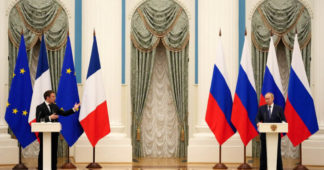Macron, who has favored diplomacy with Putin, warned against an escalation of rhetoric
Categories On Wednesday, French President Emmanuel Macron wouldn’t back President Biden’s claim that Russia is committing “genocide” in Ukraine. The French leader instead warned that an escalation of rhetoric wouldn’t bring peace.
Macron accused Russia of “war crimes” in Ukraine but favors diplomacy as the best way to end the fighting. “I want to try as much as possible to continue to be able to stop this war and to rebuild peace. I’m not sure that verbal escalations serve this cause,” he said.
Macron is one of the few Western leaders who has maintained contact with Russian President Vladimir Putin since Russia invaded on February 24. Biden hasn’t spoken with Putin, and Secretary of State Antony Blinken hasn’t spoken with his Russian counterpart, Sergey Lavrov, since February 15.
For his stance, Macron has come under fire from Ukrainian officials and other NATO countries. Last week, Polish Prime Minister Mateusz Morawiecki slammed the French leader for talking with Putin, likening it to “negotiating with Hitler.”
Ukrainian officials also criticized Macron for not agreeing with Biden’s claims of genocide. Macron said it was best to be careful with such terminology, and described Russians and Ukrainians as “brotherly peoples.”
On the same day Biden accused Russia of genocide, Newsweek published an article quoting a senior official from the Pentagon’s Defense Intelligence Agency who said the civilian casualties in Ukraine are typical of modern warfare and “hardly” amount to genocide.
Published at news.antiwar.com
Also read
Biden’s claims of “genocide” in Ukraine: A pretext for war against Russia
We remind our readers that publication of articles on our site does not mean that we agree with what is written. Our policy is to publish anything which we consider of interest, so as to assist our readers in forming their opinions. Sometimes we even publish articles with which we totally disagree, since we believe it is important for our readers to be informed on as wide a spectrum of views as possible.











